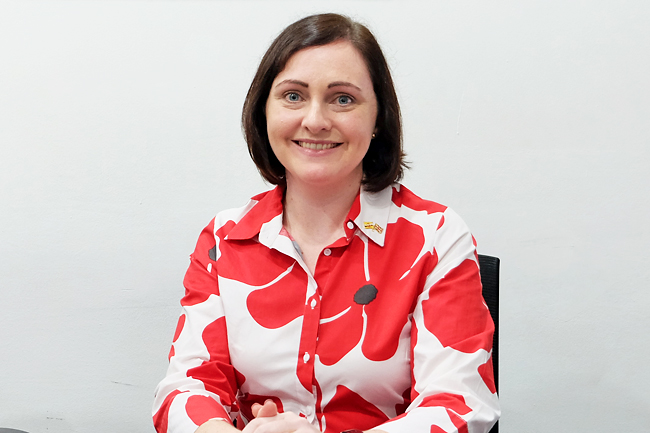In a significant move to bolster economic relations between the United Kingdom (UK) and Brunei, the UK Deputy Trade Commissioner for Asia-Pacific (Southeast Asia) Rhiannon Harries, recently visited Brunei to explore new opportunities for collaboration.
The visit, which came on the heels of a March visit by UK Trade Commissioner for Asia-Pacific, Martin Kent, who was in Brunei to enhance bilateral trade and investment, is an important step in deepening the already strong relationship between the two nations, particularly as Brunei looks to diversify its economy and align with global trends in sustainability and technological innovation.
In an interview with the media, Harries emphasised the growing potential for collaboration, particularly in sectors such as education, clean energy, and the maritime industry.
“We see Brunei as a key partner in the region, and our aim is to explore how we can work together more closely, especially in areas that are central to Brunei Vision 2035,” she said.
Reflecting on the UK’s ongoing commitment to ASEAN, she added, “This visit is part of a broader effort to engage with Brunei and strengthen ties through shared interests in trade, investment, and technological development.”
The deputy trade commissioner highlighted Brunei’s recent inclusion in the Comprehensive and Progressive Agreement for Trans-Pacific Partnership (CPTPP) as a vital step towards deeper economic collaboration.


“The UK’s participation in the CPTPP offers significant benefits to Brunei, providing added protections in areas such as investment, procurement, and regulatory transparency. This creates an environment where both our countries can thrive and deepen our economic engagement,” she explained.
A major theme of the visit was the shared interest in clean energy.
“The UK has transitioned from being an oil-producing nation to a leader in offshore wind energy, and we are excited about the potential for collaboration with Brunei in this field,” Harries said.
“Brunei’s focus on diversifying its energy sector and expanding its clean energy capacity aligns perfectly with the UK’s expertise in green technologies. We are committed to supporting Brunei as it builds a sustainable future.”
Education emerged as another key area of focus during the visit, with discussions centred on expanding existing partnerships and building new ones.
“The UK and Brunei share a rich history in education, with many in Brunei’s government having studied in the UK,” said Harries. “This strong foundation of trust and mutual respect provides a natural basis for further cooperation in educational exchanges, skills development, and collaborative programmes.”
The deputy trade commissioner also spoke about the importance of supporting Brunei’s transition towards future skills development.
“The UK is keen to work with Brunei on educational initiatives that will help build the skilled workforce necessary to support Brunei Vision 2035. This includes efforts in digitalisation and technological innovation,” she noted.
The Deputy Trade Commissioner’s visit also included meetings with the Ministry of Finance and Economy, where discussions centred on opportunities for cooperation in the clean energy sector.
“The UK’s experience in offshore wind energy offers a valuable model for Brunei as it works to diversify its energy portfolio,” Harries stated.
“By combining Brunei’s commitment to sustainability with the UK’s leadership in clean technologies, there are exciting opportunities for collaboration, particularly in renewable energy projects.”
Additionally, Harries expressed interest in Brunei’s oil and gas sector, particularly regarding the decommissioning of old oil rigs.
“The UK has extensive experience in decommissioning operations, particularly in the North Sea, and we are eager to share our expertise with Brunei,” she said.
“We believe there is significant potential for collaboration in this area, especially through organisations such as CESSCON, which is already focused on decommissioning in Brunei.”
In closing, Harries reflected on the strong and longstanding relationship between the UK and Brunei. “Brunei’s strategic location within ASEAN, coupled with its political stability, makes it an attractive destination for business and investment. The UK sees Brunei as an important partner in the region,” she emphasised.
“With its connections to Sabah and Sarawak, Brunei is uniquely positioned to serve as a hub for high-tech industries and regional connectivity.”
She also highlighted the UK’s ASEAN Economic Integration Programme, which is designed to support ASEAN member states in areas such as trade liberalisation, financial services, and regulatory reform.
“This initiative is part of our broader efforts to deepen our engagement with ASEAN, and Brunei is at the heart of this integration,” Harries explained.
“The future of UK-Brunei relations is bright, and we are committed to exploring new avenues for cooperation that will benefit both nations.”
As the first UK trade mission to Brunei, this visit signals a renewed commitment to growing economic ties and fostering mutually beneficial partnerships.
“This is just the beginning of a new chapter in our relationship with Brunei,” she concluded.
“We look forward to building on our shared goals for a sustainable, prosperous future together.”
The strengthening of UK-Brunei ties, particularly in areas such as education, clean energy, and technological innovation, is expected to create long-lasting benefits for both nations, with future projects and collaborations on the horizon.
Harries’ visit lays the groundwork for a promising and vibrant economic future. – Rizal Faisal






